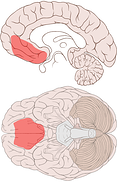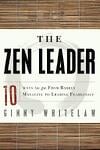I wanted to share an article that FEBI-Certified Coach Amanda Blake recently wrote. I loved this article so much I wanted to share it with our entire FEBI community! Amanda is a very talented coach and an expert in the science of somatics. If you're interested in this topic I strongly recommend you join the the call she is hosting September 10th on The Science of Personal Change. I know I'll be on the call. And for those of you new to FEBI, you can now take the full FEBI with online video debrief. Enjoy Amanda's article on how to deal with the demons of woo...
Wrestling with the Demons of Woo by Amanda Blake
This week, I had a meeting with a prospective client who was curious about doing some coaching with me, but also a bit hesitant. "I have to be honest, I'm just really not that comfortable with all that new-agey stuff," she said skeptically. All the way across the country on the other end of the phone line, I could almost hear her eyebrows go screeching up towards her hairline.
I totally get it. I'm a big lover of the far-out and the unexplained mysteries of life. But I also have a huge, cringing allergy to the ungrounded and hyperbolic claims that are so frequently made in the realm of personal growth.
As we would have said back in the 80's, gag me with a spoon.
But here's what I loved about our conversation. When I told her that learning to experience her body differently could help her make a good decision about her next move in her career, she asked "do you have research that supports that?" And, in fact, I did.
I told her about the somatic marker hypothesis, and explained that the parts of our brain that are involved in decision making also happen to be the same parts of our brain that are involved in parsing sensation. In other words, how we make decisions is heavily impacted by our ability to feel our own preferences. People who have lesions in th e relevant parts of the brain (the VMPFC, ACC, and OFC, for you neuroscience nerds out there) find themselves unable to make good decisions, and sometimes, any decisions at all.
e relevant parts of the brain (the VMPFC, ACC, and OFC, for you neuroscience nerds out there) find themselves unable to make good decisions, and sometimes, any decisions at all.
I can't tell you what a delight and a relief it was for me to be able to answer her question and point her to specific resources where she could verify it for herself. Even just a few short years ago, a question like hers would leave me flustered as I struggled to explain why embodied learning is so powerfully transformative. I remember leaving many such conversations with a frustrating sense of inadequacy and a deflated sense of confidence.
Hopefully it's not that way for you! I tend to make things harder than they need to be. :-) But there are lots of reasons why you, too, might want to be able to offer a rigorous, grounded, and credible response to this kind of genuine desire to understand. If so, then here are a few things you can do.
Start Here: Choose some result that you consistently produce for people in your work. It may be reduced stress, or an ability to negotiate more effectively, or… you name it. For instance in the example I've been talking about, it's helping someone find a meaningful direction for their life and work.
Read Up: Do some research. Who are the scientists, authors, and teachers who are working in the realm you've chosen? A google scholar search always turns up interesting results.
Write The Story: Look for how the research conclusions map to the work you do. Do you see any connections between what's coming out of the lab and the results you produce? It can be a bit of effort to make those connections, but it's worth it for moments like the one I had this week.
Test It Out: Try explaining the connections you see to trusted friends and colleagues. When you've got the kinks worked out, start trying it out on clients.
If you want a bit of a shortcut, you can also join my free call on September 10th, The Science of Personal Change. We're going to be talking about the scientific basis for embodied learning and I can't wait to share it with you.
I don't know if this particular client will decide to join me or not. But whether she does or she doesn't, I was left with the impression that I introduced her to some new ways of seeing herself and her opportunities that she didn't have before. Even if we never speak again, that's an impact I can feel good about.



 Here is how to get started. Take one of your brilliant ideas and write it down on a blank sheet of paper. Now, envision what it will be like for this idea to turn into reality. How is the world different? How is your idea/product being used? Really put yourself in that future of your idea. Now, summon your inner Organizer. Sit up straight, clean your workspace and put on some classical music. On your paper, write down several key things that would have to happen to make your idea a reality. Next, pick one of these things that you feel you can make headway on now, and write out a step-by-step list: how can you bring that about? Now, transfer this list to a calendar and hold yourself accountable to following through on these steps. It’s important to make these deadlines real for yourself, so if you are having a hard time following through, try telling a friend - sort of like an accountability buddyJ The Chinese philosopher Lao-tzu famously said, “A journey of a thousand miles begins with a single step.” With a little help from the Organizer, take that step today!
Here is how to get started. Take one of your brilliant ideas and write it down on a blank sheet of paper. Now, envision what it will be like for this idea to turn into reality. How is the world different? How is your idea/product being used? Really put yourself in that future of your idea. Now, summon your inner Organizer. Sit up straight, clean your workspace and put on some classical music. On your paper, write down several key things that would have to happen to make your idea a reality. Next, pick one of these things that you feel you can make headway on now, and write out a step-by-step list: how can you bring that about? Now, transfer this list to a calendar and hold yourself accountable to following through on these steps. It’s important to make these deadlines real for yourself, so if you are having a hard time following through, try telling a friend - sort of like an accountability buddyJ The Chinese philosopher Lao-tzu famously said, “A journey of a thousand miles begins with a single step.” With a little help from the Organizer, take that step today!

